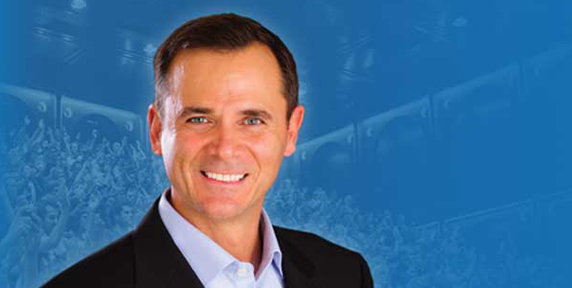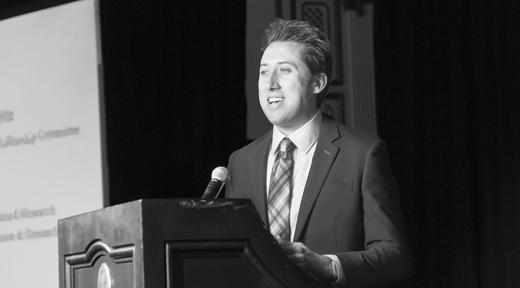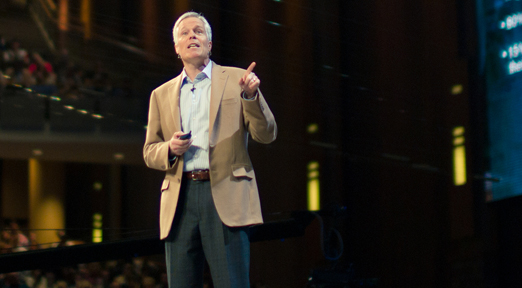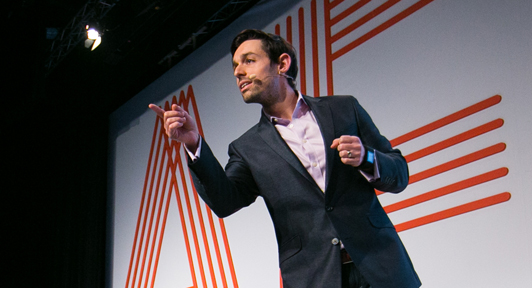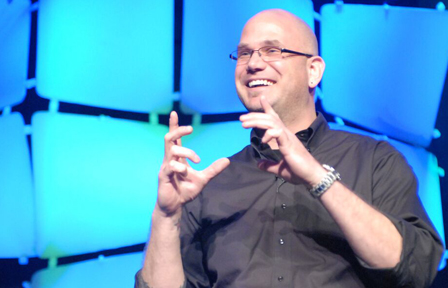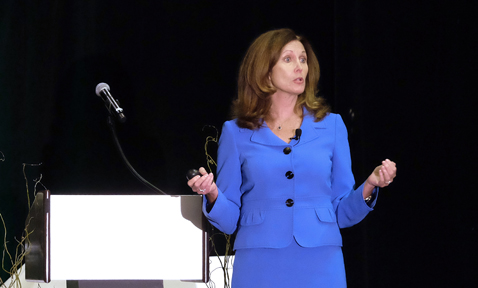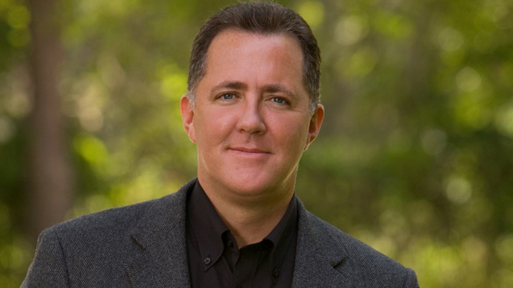
Building a Culture of World-Class Service, with Customer Service Speaker Dennis Snow
| I saw a real need for somebody to come in and help people apply the principles that they had learned at the Disney Institute and transfer them into other organizations and other industries. | |
| |
 | What inspired you to share the lessons you learned from your time at Disney with other companies? |
 | I was with Disney for 20 years and my last years there, I was with the Disney Institute, the division where companies would come to benchmark best practices with us. Back then though, we really didn't help the companies with the implementation of what they had learned, so I saw a real need for that - for somebody to come in and help people apply the principles that they had learned at the Disney Institute and transfer them into other organizations and other industries.
Once I started doing that, I found that people really responded to the whole idea of customer service, or what Disney would call guest service, and were indeed looking for ways that they could take the principles and apply them to other industries - and the principles do apply in just about every industry. |
 | What marks the difference between an ordinary customer service experience and an extraordinary customer service experience? |
 | It's the difference between doing what we do with a task mentality, and doing what we do with an experience mentality.
The differentiator is this: when you go into any business, whether a store or a restaurant, you can tell when people are focused on doing the tasks. They can do the task very effectively and very efficiently, but the problem is when you do things with a task approach, the customer feels processed. It might not be a bad experience, but it's hard to feel that loyalty when you feel like you've been processed as opposed to when you go into a company where they're still getting the task done, yet you can tell they care about the quality of your experience because of the eye contact, the tone of voice that people use, and the sense of care that they deliver. Now as the customer, we feel valued. I think that wherever the customer falls on that continuum of feeling processed and feeling valued determines their loyalty. An extraordinary customer service experience, then, comes from people in the organization caring about the quality of the experience and demonstrating that through the way they deliver what they deliver. |
 | You've written that while many companies painstakingly define their value, mission statement and vision, they often fall short of making them a practical reality. What's getting in their way? |
 | It's easy to write a vision and a mission statement, but the hard part is in the execution, which is about getting your people to buy into those things. What's getting in the way is the hard work of diffusing that throughout the entire organization and building the mission vision and values into every single thing that they do - the hiring process to the training, the ongoing communications, accountability processes, recognition processes, etc. Those things are critical to the process of taking something from being just a good idea to embedding it in the culture, and that's where the hard work really comes into play. Actually weaving values into the company processes takes a tremendous amount of commitment. |
| The only way to close that gap is embed those values into the employee processes. Until you do that, it's not a corporate culture; it's a corporate wish. | |
| |
 | What can leaders do to close the gap between their ideal corporate culture and the actual corporate culture? |
 | Let's go back to the mission, vision and values and ask ourselves, "Are we hiring people wired this way? How can we keep this message in front of people throughout their whole career? How can we weave this into every training opportunity that comes along? Are these things truly non-negotiable? These things that we put on a poster, on our wallet card, are they truly non-negotiable? Are they built into the accountability processes?" and so forth. The only way to close that gap is embed those values into the employee processes. Until you do that, it's not a corporate culture; it's a corporate wish. |
 | What steps can leaders take towards building a customer service culture specifically? |
 | It’s crucial that leaders involve their employees, because their employees are the ones out there dealing with the customers all the time. One of the first steps to getting the buy-in and building that customer service culture is to engage employees in the forward movement of the organization by looking at some of the key customer processes from start to finish and asking employees, "Okay, so what would an excellent experience look like at each step of this process? What are some things that you do? What are some things that you've heard people do at each step to make it a great experience?"
Get the ideas of the employees especially in identifying customers frustrations, because, again, they are the ones that deal with customer frustrations all the time. Next, it’s important to put mechanisms in place to help alleviate those frustrations, and throughout the whole process, build tools that set employees up to be heroes. One of the examples that I always love to use is that people who come to Disney World have a lot of questions, and as an employee or as a cast member, there's no way you can know the answer to every question. Since it is frustrating when somebody says, "I don't know," they put in a mechanism called Information 4500, where they keep a database of all of the questions that guests ask and the answers to those questions. So if you come up to me and ask me a question I don't know the answer to, I can just pick up the phone, dial 4500, say, "I've got this guest with this question", the person on the other end of the line answers it for me, and now two things happen: you the guest have the answer to your question, and the next time somebody asks that question, I've got the answer. |
| You can't teach somebody to have attention to detail. You can't teach them to have empathy. They've got to bring those raw materials to the job. | |
| |
 | What are some ways hiring managers can identify applicants who will be engaged in their company? |
 | I think the key thing now is to have a competency-based hiring process that's based on your superstar employees - how they do what they do, how they look at what they do, what are the tools of greatest use to them, and so forth.
First, have a very clear understanding of what makes a superstar employee in whatever job category we're talking about. Second, build a competency-based interview, a structured interview based on that, so that you've really got a template or a benchmark of what you're looking for. When you're interviewing people, don't just listen to what they say and how they respond to those open-ended questions, but also just observe them. Are you seeing the behaviors that you want to see when they're out on the job? You can't teach somebody to have attention to detail. You can't teach them to have empathy. They've got to bring those raw materials to the job, and then you can say, "Alright, now let's see how we can take those raw materials and apply them in the culture of our organization." So when I'm working with organizations, I always say, "Listen and watch. Are you hearing what you want to hear? And are you seeing what you want to see?" Because don't think you're going to take somebody who doesn't have those things and put them through some magical training program that's going to change them, because it doesn't work. |
 | What are the key components to effective employee training? |
 | The first thing, and this is where many organizations kind of miss out, is they don't share the details of the culture right upfront. The training starts during the interview process. How are you treating applicants through the interview process? That's communicating volumes of information to them. For example, if you say our culture is about respect for the individual, and I show up for an interview, I'm kind of treated as an interruption, and the person that I'm supposed to be interviewing with isn't there, that's communicating a great deal of information to me.
Following that, there's a very strong emotional connection that's created during that initial training process of, "Here's what the guest experience is supposed to be, here's what the service non-negotiables are in the organization." For us at Disney, one of the non-negotiables was, if you're walking along as a cast member and you see a piece of trash on the ground, it's your job to go over, pick it up, and throw it away. We connect that practice with the number one compliment that Disney World gets, which is how clean the place is. I went through that new hire training back in 1978, and I remember it like it was yesterday. If you ask any Disney cast member about their new hire orientation, which we called "Disney traditions", they will have a very clear memory of how powerful that time was. Training is about introducing people to the culture and what we're all about and building that pride factor, that emotional connection before we start. After that, you can get into the mechanics of the job. In fact, many organizations make the mistake of jumping right into, "Okay, here's how you do this. Here's how you do this. Here's how you do this. Fill out this paperwork and okay, now go out and give great service." |
| Every single thing that you do as a leader speaks, so ask yourself: is it enhancing the experience and what you want to be happening, or is it detracting from it? | |
| |
 | What are the three examples of "Walk the talk" leadership behaviors that reinforce organizational values? |
 | I've got a great photograph that really exemplifies this, and I wish this could come across in a writing, but it's an old grainy photograph that I got of Walt Disney at Disneyland, picking up trash off the ground. To me that is the epitome of it - when your employees see you doing the things that you're asking them to do. That says, "It's not you keep the park clean, it's we keep the park clean." A big part then is just doing those things.
The way we as leaders talk about our customers is another example. Sometimes I overhear leaders say terrible things about their customers and that perpetuates that throughout the organization. Similarly, sometimes leaders of a division complain about people in another division of the company and then expect their employees to be team players. So “walk the talk” leadership is about: What are we doing? What are we saying? and How are we interacting with other people in other operations in our organization? One of the terms that I like to use is, "Everything speaks." Every single thing that you do as a leader speaks so ask yourself, is it enhancing the experience and what you want to be happening, or is it detracting from it? |
 | Part of your early experiences at Disney included, "Standing in the rain for hours telling guests Space Mountain was closed." What are some tactics employees can use to give customers bad news while maintaining top-notch service? |
 | You're not going to be able to make everybody happy. It would be great to have a formula to do that, but when you're using the "Space Mountain is closed" example, no matter what I say, people aren't going to be happy that Space Mountain is closed. However, treating them with respect makes the difference.
Getting a robotic response of, "Yeah, it's closed. I'm not sure when it'll be open" irritates people. They’ll have a different experience though if they’re told, "Oh, yeah, I know it's closed, but here's what's coming. This is why it's closed because we're adding this to it or this is what's going to happen or this is when it's going to reopen, so please come back at this time, and it'll be ready for you." It really depends on the situation of why it might be closed, but the idea is to demonstrate empathy with the guests, so that they understand that you understand their frustration and see that you care. Sometimes I would say, "Yeah, Space Mountain is closed but I'll tell you what, if you go over to Big Thunder Mountain right now, it's open right now and the line isn't very long." If I could see somebody was really in meltdown mode because they came all the way from wherever to go on Space Mountain, I could easily call over to one of the other attractions and say, "Hey, I've sent this guest over to you, they're really upset about the situation, can you go ahead and put them right on the ride so that they don't have to wait in line?" In this case extraordinary customer service is about reading the guest, reading the situation, and them understanding that you understand that they're frustrated. Again, it's not going to make them happy that Space Mountain is closed, but they feel like they've been respected and like they've been acknowledged. To bring customer service speaker Dennis Snow to your organization, please contact Michael Frick at: Mike@Speaking.com |

